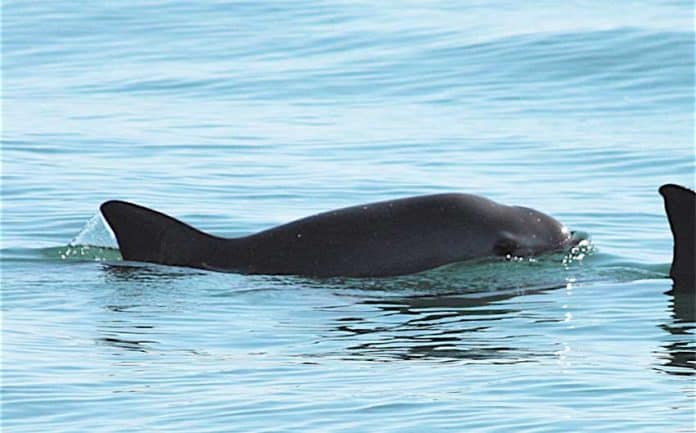A United States court has ordered the U.S. government to impose a ban on Mexican seafood imports caught using gillnets in the northern Gulf of California as a measure to protect the vaquita porpoise.
But the ruling is expected to have a significant economic impact on fishing communities in the region.
The U.S. Court of International Trade issued the decision yesterday, denying a motion from the administration of President Donald Trump to dismiss the case, writing: “Evidence shows that vaquita are killed by gillnet fishing and are on the verge of extinction: because the statutory duty to ban fish imports resulting in such excessive marine mammal bycatch is mandatory, the government must comply with it.”
The ruling follows a lawsuit filed in March by three conservation groups — the Natural Resources Defense Council, the Center for Biological Diversity and the Animal Welfare Institute — against the Department of Commerce. The suit argued that under the Marine Mammal Protection Act (MMPA) the U.S. government has a legal obligation to impose a ban on Mexican seafood imports in order to protect the vaquita.
Judge Gary Katzmann agreed, ruling that the “law commands” that “the Secretary of the Treasury shall ban imports of fish and fish products from northern Gulf fisheries that utilize gillnets and incidentally kill vaquita in excess of United States standards.”
Katzmann also wrote “what cannot be disputed is that the vaquita’s plight is desperate, and that even one more bycatch death in the gillnets of fisheries in its range threatens the very existence of the species.”
Giulia Good Stefani, staff attorney with the Natural Resources Defense Council, applauded the court’s decision.
“A ban on gillnet-caught seafood from Mexico’s Gulf of California is the lifeline the vaquita desperately needs,” she said.
“Collectively, our organizations have spent over a decade working to save the vaquita — and never has extinction felt so close — but now, the world’s smallest and most endangered porpoise has what may be its very last chance.”
But a lifeline for the vaquita means something else for those who depend on the commercial fishing industry.
The leader of the Mexican Confederation of Fishery and Aquaculture Cooperatives (Conmecoop) said that he would meet today with the head of the National Aquaculture and Fisheries Commission (Conapesca) to determine a strategy to try to have the ban lifted.
José Jesús Camacho Osuna described the ruling as “very bad news,” explaining that the economic impact on local fishermen would be “very big” and hurt a lot of families. He said it will even affect seafood products bound for China, such as jellyfish, because they transit through the United States on their way to their final destination.
The communities most affected by the ban will be San Felipe in Baja California and Santa Clara and Puerto Peñasco in Sonora, Camacho said.
In order for the ban to be lifted, Mexico must meet United States fishing standards, which conservationists say would involve improving regulations and enforcement to ensure that vaquitas are not killed in gillnets.
Christopher Wilson, deputy director of the Mexico Institute at the Wilson Center, said the court ruling could further complicate an already strained relationship between Mexico and the United States.
“With a difficult renegotiation of NAFTA pending, a trade skirmish over U.S. steel and aluminum tariffs under way and potential auto tariffs on the horizon, the timing of this import ban is pretty awful in terms of bilateral relations,” he said.
“But with the vaquita population dipping . . . perhaps nearing the single-digits, the timing is clearly much worse for the porpoise.”
Scientists estimate that there are just 15 vaquitas left and that the species could become extinct by 2021.
The illegal fishing of totoaba, whose swim bladders are considered a delicacy in China and yield high prices, has been particularly detrimental to the vaquita marina.
A permanent ban on gillnet fishing went into effect over a year ago in the northern part of the Sea of Cortés but environmental groups charge that authorities haven’t done enough to enforce it.
Representatives from the organizations that filed the lawsuit expressed optimism that the ruling would provide much-needed impetus for the Mexican government to act.
“With vaquitas on the brink of extinction, these economic sanctions are painful but necessary to push Mexican officials to finally protect these little porpoises,” said Sarah Uhlemann, international program director at the Center for Biological Diversity.
“For 20 years, the Mexican government has promised to save the vaquita but failed to take meaningful action. That has to change or we’ll lose these animals forever.”
Susan Millward, director of the Marine Animal Program at the Animal Welfare Institute, echoed the sentiment.
“The Mexican government must now protect the vaquita from gillnets before it is too late and this species disappears forever,” she said.
Source: Milenio (sp), El Independiente (sp), The Hill (en), The Los Angeles Times (en)
